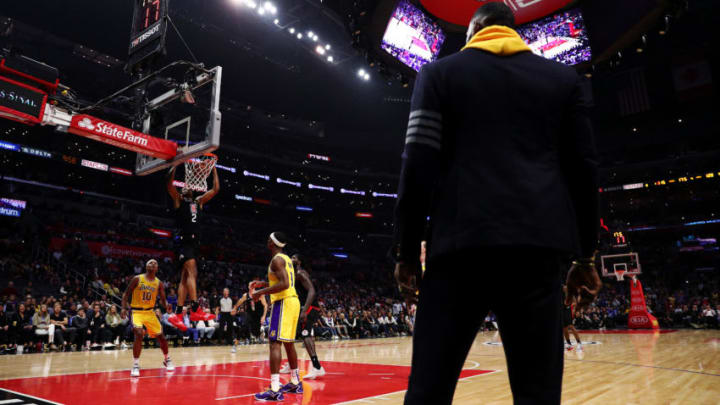NBA Playoffs 2019: It’s time to sacrifice the G.O.A.T.

Two-hundred-forty players will be eligible to play in this year’s NBA playoffs. Of those, 150-160 will likely see meaningful minutes. Yet the most meaningful storyline of these playoffs involves none of them. With LeBron James and the Lakers lottery-bound, this is the NBA’s first G.O.A.T.-less postseason in 30 years.
The concept of the G.O.A.T. essentially began with Michael Jordan and takes its current form in LeBron. In 2006, his first postseason foray, the Cavaliers’ minutes leaders after James were Eric Snow, Zydrunas Ilgauskas, Drew Gooden, Damon Jones and Donyell Marshall. James led that team to a 3-2 series lead in the second-round over the back-to-back conference champion Detroit Pistons. Cleveland would eventually succumb, losing a Game 7 where LeBron scored 27 and the rest of the team scored just 34. This was the first year Cleveland advanced in the playoffs since James was eight years old. That’s some serious G.O.A.T.-level work there.
Back in 1988, Jordan won MVP and Defensive Player of the Year. He led the league in scoring with an average no one not named “Michael Jordan” had put up in over 20 years. In the playoffs, he was the reason Chicago moved past the first round for the first time since he’d been in high school. For a decade after, Jordan’s successes were virtually unprecedented. “What about 1994-95?” you may ask. That asterisk of an era was bossed by Hakeem Olajuwon, the only player besides MJ to win MVP and DPOY in the same season. Also, even while retired, Jordan gave us Space Jam. Show some respect.
Between Jordan’s second retirement and James’ ascension came a seven-year itch when Tim Duncan, Shaquille O’Neal and Kobe Bryant alternated dominating, an ouroboros of awesome. Each won three championships in that span. Kobe earned three top-five MVP finishes; Shaq had five, winning one; Duncan finished top-five all seven seasons and won in back-to-back years. What if one of them ended up elsewhere — the Hornets don’t trade Bryant’s draft rights in 1996, the Celtics land Duncan in 1997, or Orlando re-signs Shaq? Duncan and Kobe ended up with five titles and Shaq four; it’s not hard to imagine any equaling Jordan’s six championships with a little historical re-shuffling.
But here we start to see it’s not the answer to “Who is the G.O.A.T.?” that’s problematic, but the question itself. Over time the possible answer has mummified into a rigid binary: MJ or LeBron. There’s nothing wrong with either choice. But consider there’ve been thousands of players since Jordan came along in 1984. If two men are head and shoulders above the rest, isn’t that great enough? And what of Kobe, Shaq and Duncan? Do we minimize their greatness because they had worthy contemporaries, something Jordan and James did not? Was Muhammad Ali’s grandeur raised or razed because of Joe Frazier? The former, surely.
Remember how Jordan scoring 35 a night in1988 was the most by anyone besides him since the 1960s? Do you know who the last player to average that many was? I’ll wager most readers can’t guess who that legend was; he’s just another one-percent performer lost to history. Forgotten not because of some collective failure among basketball fans, but for the opposite reason: ignorance is one of the last vestiges of traditional fandom.
The whole idea of the G.O.A.T. came into being in the 1990s — not because of Jordan, but because that’s when sports-talk radio and ESPN grew powerful enough to start shaping the conversation around sports rather than merely report on it. Sports talk became a national conversation rather than a parochial one because that was the simplest way to squash nuance and level the playing field. Feelings are complicated. Numbers are easy. Especially when boiled down to “How many rings?” Reality reduced to a binary: instead of ones and zeroes, you either won or you’re a zero.
One of the perks of a LeBron-less playoffs is it allows us to scrap the G.O.A.T. debate altogether, or at least to remember it’s a thought exercise and not an intelligence test. All any of us can ever really do is discuss the greatest of our time. G.O.O.T doesn’t translate as easily to a cute emoji, but who decided goats were all that anyway? Plus G.O.O.T. sounds like the German gut, meaning “good,” and gut looks like “gut,” and this is all less about numbers and facts and more about our gut feelings anyway.
Without LeBron chasing Jordan the next two months, the slate is clean for players, teams and fans to choose their own adventures. What does Giannis Antetokounmpo look like the first time he’s performing under the pressure to win? Is this the year James Harden’s regular-season brilliance translates to the playoffs? Which star takes the quantum leap to superstardom? Joel Embiid? Damian Lillard? Nikola Jokic?
Toronto is finally free of the specter of James, as is the rest of the East. The Celtics have been spared their Jungian nightmare of meeting a Laker team led by James and Anthony Davis in the Finals and can focus on moving on from their nightmare regular season. Meanwhile, the West, a Rube Goldberg of death even without James to deal with, is rife with curiosities. Is Denver for real? Will Portland punch above its weight? Can Utah progress from theoretical darkhorse to pull off a real upset? Do Houston’s past four months foreshadow a magical run? Is Golden State together enough to win their fourth title in five years, something no team’s managed in over half a century?
So many questions to be answered the next couple of months. So much entertainment. And then Zion Williamson arrives. G.O.A.T. or no G.O.A.T., there are reasons aplenty to stay tuned.